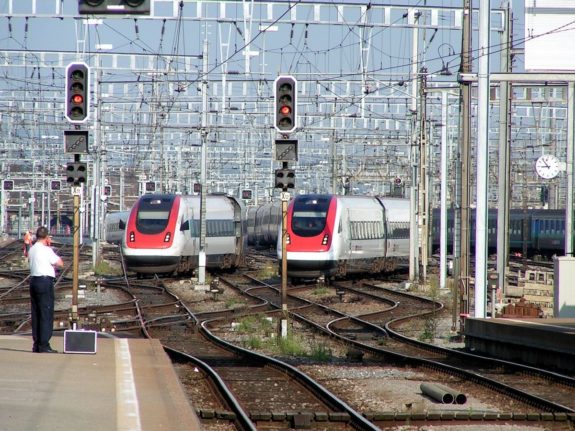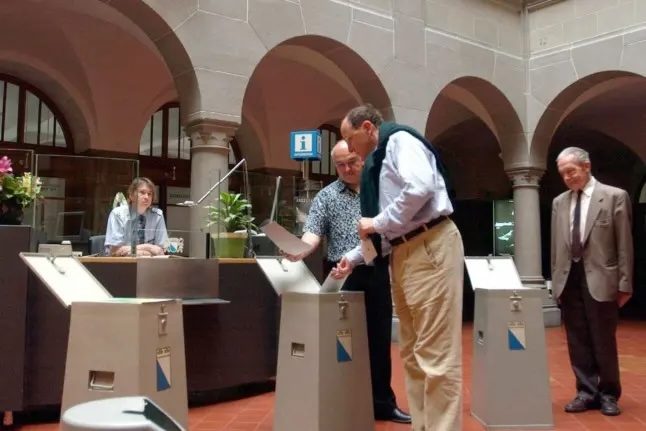EU chief Ursula von der Leyen and Swiss President Viola Amherd launched negotiations in Brussels on Monday on “a broad package of measures to deepen and expand the EU-Switzerland relationship”, the European Commission said in a statement.
“Today is the beginning of a new chapter in our relationship with Switzerland based on a renewed trust and engagement between partners and neighbours,” von der Leyen said.
Switzerland suddenly walked away from more than a decade of negotiations in May 2021 after the EU refused to budge on Swiss demands to exclude key issues relating to state aid, wage protections and freedom of movement.
The move angered Brussels and strained the relationship between the two sides.
But now both are ready to start talking again.
#EU-Kommissionspräsidentin @vonderleyen und ich haben heute die Verhandlungen zwischen der 🇪🇺 und der 🇨🇭 eröffnet. Unter anderen geht es für die Schweizer Unternehmen um den Zugang zum europäischen Markt und die Beteiligung der Forschenden an europäischen Projekten. #Bilaterale pic.twitter.com/X2VKTkaQDs
— Viola Amherd (@Violapamherd) March 18, 2024
From the Swiss side, the topic of negotiations takes into consideration the results of the consultation with the foreign affairs committees and other parliamentary groups, the cantons, as well as social and economic sectors.
In other words, everyone concerned by the Swiss – EU relations has had a chance to have their say.
What will Switzerland push for?
These are the issues Switzerland will bring to the negotiating table:
Immigration
The majority of foreign nationals living in — and still coming to — Switzerland are from EU states, so immigration is a hot-button topic.
About 1.4 million citizens of the European Union currently reside in Switzerland.
Therefore,“the objective of immigration geared towards the labour market will be strengthened, as will the wording concerning the right of residence, with the aim of better protecting the Swiss social system,” the Federal Council said.
Wage protection
“The objective of ensuring wage and working conditions by maintaining the current level of protection sustainably will be reaffirmed,” the government pointed out.
This will concern the so-called ‘posted workers’ — that is, people being sent to work in Switzerland on a temporary basis by their employer based in a EU state.
Electricity
Switzerland and the EU have exchanged energy for decades, with a competition-oriented single market emerging over the last 25 years.
“The result of this development is a new legal and economic reality of the energy markets surrounding Switzerland, particularly relevant in the electricity sector,” according to the government.
Swiss government therefore wants to negotiate an agreement with the EU, in order to allow full access for Switzerland to the single market for electricity and “ensure cooperation in this sector with the EU in the future”.
Overland Transport Agreement
In parallel with the opening of international rail passenger transport, the Federal Council will seek to maintain Switzerland’s prerogative to allocate slots on its own territory.
“The controlled opening up of international rail transport must not affect the quality of public transport in Switzerland,” the government said.
Agreement on agricultural products
The mandate specifies that customs tariffs are to remain in place, including tariff quotas and their method of administration.
That’s because “Switzerland’s sovereignty over its agricultural policy must remain unaffected”.
Swiss sovereignty
The government wants to ensure that Switzerland will always be able to decide autonomously whether or not it wishes to adopt European law.
Its direct-democracy system of referendums must also remain intact.
In the event of a dispute, Switzerland and the EU will be equally represented in an arbitration tribunal, which will have to decide.
The arbitral tribunal may, nevertheless, appeal to the European Court of Justice, the competent authority in matters of European law.
How long will the Swiss-EU talks last?
At the beginning of June, the European Union will elect a new Parliament, which will then have to appoint a new Commission.
Negotiations are therefore expected to take a while, but no exact timeline has been released.
The love-hate relationship
One way to describe Switzerland’s relationship with the EU is this: it doesn’t want to be part of the bloc, but it can’t live without it either.
To date, Switzerland is one of only a handful of western European nations that have not joined the European Union, and yet it has strong ties with the bloc.
One is that exports are the backbone of Swiss economy, with the EU, and in particular Germany, being Switzerland’s main trading partners.
Switzerland relies on its access to the single market in other ways as well, all of which play a major part in the country’s economic prosperity. For this reason, Bern and Brussels have signed over 100 reciprocal treaties, covering not only trade, but also matters of cross-border security, research and education, agriculture, transport, environment, police cooperation, and a number of other agreements.
One of the major ones is the Free Movement of Persons Agreement, which allows citizens of EU states to freely work and live in Switzerland, and vice-versa.
Another makes Switzerland part of the borderless Schengen area, making travel through Europe much easier and more convenient for Swiss citizens.
READ ALSO : What is Switzerland’s deal with the EU?
Will Switzerland ever join the EU?
‘Ever’ is a very long time, but there has not been in the past, nor is there currently, a strong desire on the part of Switzerland’s population to become a member.
In the last referendum to this effect, in 2001, nearly 77 percent of voters rejected the proposal to open membership negotiations with the EU.
There are several reasons why this is so, experts say.
“Switzerland has a very strong sense of independence; joining the EU would impinge on its autonomy,” according to political scientist Daniel Warner, former deputy to the director of The Graduate Institute of International and Development Studies in Geneva.
And as for Fabio Wasserfallen, professor of European politics at the University of Bern, he pointed out that “Switzerland is too rich and too stable to want to join the EU”.
READ ALSO: Why is Switzerland not part of the European Union?
What ‘price’ does Bern pay for access to the EU market?
Switzerland is not exactly ‘mooching off’ Brussel’s goodwill.
It contributes the so-called ‘cohesion payments’
The payment towards the Cohesion Fund is part of the price Switzerland is required to pay for access to the all-important EU single market.
In 2022, it has paid over 1 billion francs to fund a range of projects in ‘poorer’ member states until 2029.
These projects include research, health, vocational training, integration, security, the inclusion of minorities, citizen engagement, biodiversity, environmental and climate protection, urban planning, support for small companies and tourism.
READ ALSO : What are the ‘cohesion payments’ Switzerland pays to the EU?



 Please whitelist us to continue reading.
Please whitelist us to continue reading.
Member comments